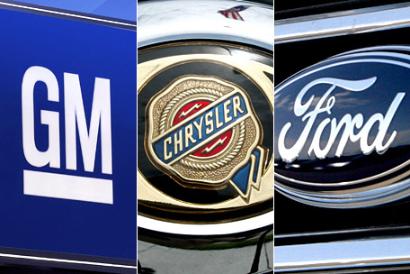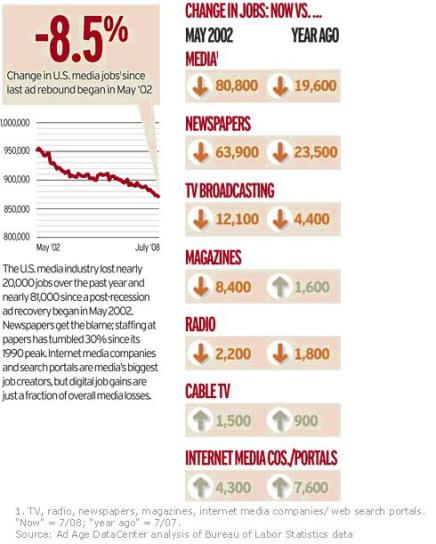Cerberus and Big 3 Automakers Beg for Billions as Media Industry Whimpers and Shrinks

As I track the steady and continuing deterioration of America's media industry, I can't help but wonder why financial institutions and the automotive industry are considered so vital to our economic stability yet media and communications are perceived as having so little relevance. Why are we about to give billions to refund a bad investment in Chrysler made by equity investment fund Cerberus Capital, but thousands are laid off by media companies in the past week without a whimper?
How do we justify the accelerating disappearance of daily newspapers from hundreds of American cities and towns? What will the government do to protect the value of thousands of broadcast station licenses? In the next 24-months, say analysts, many of these licenses will become valueless as station owners liquidate and go bankrupt. The government has forced television stations to invest billions in a digital conversion scheduled to occur in just two months. The return on this investment is difficult to assess, especially since the industry will be hard pressed to justify further commitment to enhanced interactive capabilities and with advertising revenues shrinking.
Radio stations are being asked to invest billions in the conversion to high definition… investments that could go down the tubes if the industry is unable to develop new revenue and profit models.
In the past two decades billions of dollars have flowed from publicly traded media corporations to a few Wall Street profiteers who have returned little value to the industry or the economy. I understand the argument that bailing out the auto companies prevents two million more Americans from joining the ranks of the unemployed. And I understand the trickle down impact that the auto industry has on other companies and segments of the economy. But these arguments don't hold water when subjected to a realistic examination of the industry's past or its likely ability to use bailout funds wisely. Although media and advertising companies depend on the auto industry for a major percentage of revenues, a bailout is likely to result in auto makers limiting marketing budgets to a fraction of current investments. Bailout or not, we can be reasonably certain the number of car dealerships will be cut in half over the next five years. Bailout funds are unlikely to make their way to Main Street and they definitely will not find a path to Madison Avenue. And at the same time, the federal government will be considering the imposition of a tax on advertising, increased regulation of pharmaceutical advertising and harsh privacy laws that could decimate the value of digital media. From 2002 to December 5 of this year the media industry has lost nearly 100,000 full-time jobs – or 10 percent of its total workforce. (See data below.) Based on current attrition rates, at least another 100,000 jobs could be lost in the next 12-months. (These statistics do not include nearly 1 million non-full time jobs and do not include related jobs in the advertising or entertainment businesses.) Fully 30% of these positions are in jeopardy.
What is the moral imperative for bailing out inept auto industry management and Wall Street greed while allowing the media industry to collapse? As pointed out by The New York Times, "Last year, Cerberus and about 100 co-investors bought 80.1 percent of Chrysler for $7.4 billion from German carmaker Daimler. Since then, Chryslerhas eliminated more than 30,000 jobs and struggled to keep itself afloat while its sales have plummeted. Chrysler is asking the government for $7 billion to get through the next few months."
Cerberus is asking for the government to essentially refund 100% of its original buyout price while laying off thousands of employees, making cars Americans don't want to buy, and pocketing millions in executive and Board of Director salaries. I've yet to hear a coherent long-term vision for a rebirth of the American auto industry nor do I believe the government can show favoritism for one industry over another. At the very least, I would like to be assured that some of the bailout billions provided to the auto industry will be committed to advertising investments that support our nation's digital infrastructure and maintain the economic vitality of local media in small and mid-sized American cities.
Media and entertainment are America's number one export and return far more to the balance of trade than the American auto industry. What is the government's plan to prevent the Screen Actor's Guild from striking and potentially throwing Los Angeles into a deep depression? What is the plan for supporting decaying media empires that have served as the foundation for our capitalistic and democratic society? What is the plan for enabling media companies to invest aggressively in infrastructure and manpower to monetize the billions invested in required digital upgrades?
While an auto bailout is likely to lead to further limitations on marketing and advertising budgets, it will not limit lobbying costs. The Times also reports that Cerberus, Chrysler, GMand Ford have spent a combined $22 million on Congressional lobbying this year. Congress and the press might attack auto executives for flying to Washington in private jets, but no one questions $22 million in wasted graft and lobbying to curry favor in Washington.
I'm not opposed to supporting American auto workers and their families. But trillions of dollars have flowed from the middle class to a small wealthy elite in the past decade, draining corporations and the government. Thus far it appears the government bailout is giving billions more to that same wealthy Wall Street elite while claiming to be investing in Main Street. Before a penny goes to Cerberus and its co-conspirators, we need to be asking tough questions and thinking about our own industry's economic future.
From Ad Age;Published:September 29, 2008
Jack Myersadvises corporations on media economics.He can be contacted at (212) 875-8002 and jm@jackmyers.com.



